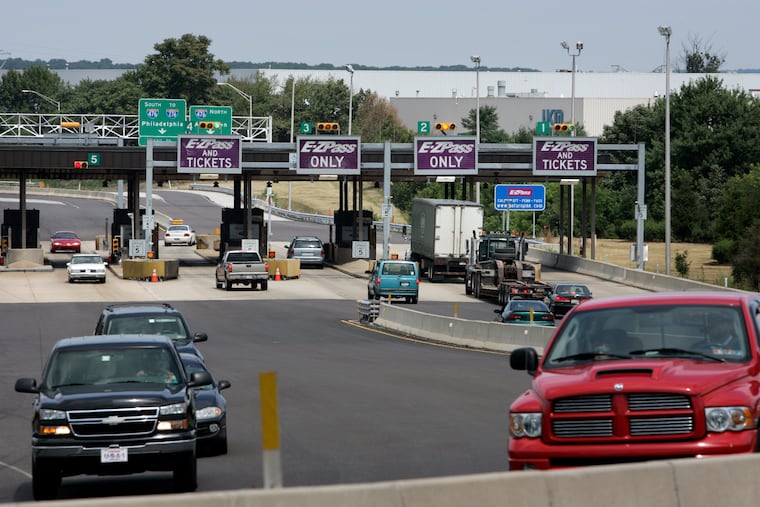Pa. Turnpike toll hikes are pitting Philly suburban commuters against the state. End this now. | Maria Panaritis
America’s first so-called “superhighway” is raising tolls for the 12th year in a row on Sunday (6 percent). If you’re ready to scream, you’re in good company.

In this world, as the old saying goes, nothing can be said to be certain except death, taxes — and if you live in Pennsylvania, turnpike toll increases.
America’s first “superhighway” is raising tolls for the 12th year in a row on Sunday (6%), and if you’re ready to scream, you’re in good company. It’s only the latest of predatory price hikes mandated by the state’s perennially feckless elected officials.
The loan-sharkey rate increases have disproportionately soaked Philadelphia-area commuters. It’s because of a 2007 law that turned the turnpike system into a piggy bank. A law that has helped legislators and governors avoid raising taxes for state roads and mass transit. A law that slapped our region with much of the fallout.
No longer does the quasi-independent Pennsylvania Turnpike Commission take care only of its 552 miles of roads and tunnels; it also has had to borrow and shell out billions more since 2008 to help fund utterly unrelated state transportation projects. The toll increases are to pay for those loans and also for billions in turnpike reconstruction projects.
“We understand that this is a burden,” Turnpike Commission spokesperson Carl DeFebo told me Thursday. “We have been seeking relief from the legislature.”
Since commuter trips in Southeastern Pennsylvania account for about 60% of all turnpike traffic, this state assessment on the turnpike has, effectively, been a tax on Southeastern Pennsylvania motorists. And a HUGE out-of-pocket one, considering the rate increases over the last decade.
On Sunday, if you travel across the state from New Jersey to Ohio, you’ll pay $61.20 cash — quadruple what it cost in 2008, when the same trip came with a $15.25 charge.
“So you’ve become like Comcast,” I half-jokingly told DeFebo as he patiently walked me through all the awful numbers. After a spell of dead silence during our phone conversation, there was an uncomfortable laugh.
(Just a few weeks ago, Inquirer colleague Christian Hetrick penned this Christmas ditty about Philadelphia’s stunningly successful but Scrooge-y corporate citizen: Happy holidays from Comcast. Your cable bill is going up again.)
The turnpike wins that comparison by putting your money where its E-ZPass transponder sends it: Into Turnpike Commission coffers. Tolls have gone up exponentially each year since 2009, after having gone up just five times in the seven decades before that.
The commission says tolls will continue to rise annually as we head toward 2050. It has no choice. It has spent nearly $7 billion in borrowed money since 2009 to help finance the Pennsylvania Department of Transportation and an additional $5.7 billion to rebuild and expand the roadway across the state.
And to think — the only reason the Turnpike Commission came into being in 1937 was to serve as a vehicle to build what began as a 160-mile road.
By 2007 it was in the black, with more assets than liabilities on its books.
So Democratic Gov. Ed Rendell and the legislature enacted a law mandating payments from the commission to help pay for transportation projects. The law had planned to toll I-80, which is free, to generate that money, but federal authorities blocked it. The legislature’s response was to keep the plan in place, but force the turnpike to pony up from its own toll coffers.
Early last year, elected state Auditor General Eugene DePasquale sized up the situation gravely in an audit by his office.
“The PTC’s financial situation continues to decline with the increased issuance of debt coupled with the PTC’s capital spending plan for maintenance and improvements to the Turnpike,” DePasquale wrote.
Even after toll rates had increased substantially over the last decade, DePasquale noted that they would just about triple by 2048 — and that’s even taking into account a pledge in the law to eliminate turnpike payments to PennDot by 2023.
Still, there is fear that our next governor and the General Assembly may renege.
Why? Because it’s politically easier to keep pulling millions out of commuters than it is to raise state taxes to come up with the dough. And the Turnpike Commission consists of members appointed by the governor in concert with the state Senate. It’s not like those commissioners run for office.
The turnpike has had to cut back on construction projects to balance all these competing pressures. Meanwhile, traffic growth on the roadway has plateaued, even as it has grown on far less expensive turnpikes in neighboring states.
The trucking industry, whose massive vehicles transport goods to and from our doors in this age of Amazon ordering, has been trying through the courts to overturn the PennDot payments. This is the same industry whose trucks, at least once you get west of Carlisle, account for about a third of turnpike traffic.
I asked DeFebo what the turnpike does with commuter complaints about toll hikes. He said the commission writes back. I asked if those letters include the names and phone numbers of lawmakers who can end this practice by fiat.
No. Of course the commission does not do that. The turnpike can’t bite the hand that feeds it — even if that hand is also picking its pocket.
But Siri can easily dial the governor or any of the state’s House and Senate members next time you breeze through an E-ZPass lane. Your message should be simple: End this now.